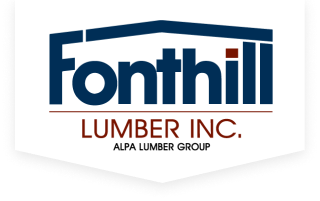Roof Truss Plates: Definition, Types & Benefits

While good quality lumber itself contributes to the strength and longevity of all kinds of roof trusses, there is another element at play here. That is the truss plate. Often unnoticed, this small, metal connector is what the overall stability and integrity of the trusses hinges on.
At Fonthill Lumber Inc., our roof trusses are pre-fabricated with premium timber, which is then connected with robust truss plates to ensure the entire structure holds for a lifetime. In this blog, we will tell you everything you need to know about truss plates – including what they are, their types, and why they matter for your next build. Let us begin!
Defining Roof Truss Plates
Simply put, truss plates are thin metallic sheets. They are typically rectangular with one outstanding feature – they are dotted with teeth. These teeth help them join the individual components of roof trusses together. The teeth embed themselves in the wood, thus creating a highly secure mechanical bond with great endurance.
As for the method of application, they are fixed into the wood with the help of a hydraulic press. The entire process is carried out in a controlled manufacturing environment to ensure that each connection meets common structural and safety standards, as well as building and engineering codes.
Common Names Of Roof Truss Plates
Truss plates are also called:
- Truss brackets
- Truss connectors
- Connector plates
- Gang Nail Plates
So if you hear your local supplier using any of these terms, know that they are one and the same as truss plates.
Types Of Roof Truss Plates
Though each truss plate type serves a similar function – i.e., securing truss components made of engineered wood, they differ when it comes to application and load requirements. We have discussed each of them below:
1. Standard Gang Nail Plates
The standard type, as the name suggests, gang nail plates are rectangular in shape. They are pressed onto joints where individual truss components come in contact. Almost all residential roof trusses have gang nail plates in them.
2. Specialty Connector Plates
For certain joints, standard connector plates are not the ideal option. Instead, the following variations prove to be a better fit:
- Angle plates - best suited for corners
- T-plates - designed for mid-beam intersections
- Custom plates - made for atypical joints or to accommodate heavy loads
3. Galvanized & Stainless Steel Plates
In general, truss plates are made of galvanized steel due to their natural resistance to rust and corrosion. However, for projects in more demanding climates or environments, stainless steel trusses may be used because of the extra protection and durability they offer. They are often recommended for agricultural projects or builds on the coastline.
Benefits Of Roof Truss Plates
Apart from joining different members of engineered wood trusses together, these connectors bring more benefits to the table than apparent at face value. Noteworthy ones include:
-
Enhanced Structural Integrity
With truss plates securing the entire system, you can count on its structural integrity. They help in efficient load distribution too, ensuring your trusses stay safe for use in the long run.
-
Time & Labor Savings
The good news is roof trusses are entirely manufactured in a factory-controlled setting and this includes the application of plates. What it means is, you do not need to assemble these trusses onsite or invest in complex joinery. All you have to do is install it where you want, thus boosting framing efficiency.
-
Consistent Performance
Manufactured in accordance with strict quality standards, truss plates offer reliable strength in all kinds of settings. This gives builders and engineers the freedom to conceptualize code-compliant roofing systems.
-
Cost-Effective Engineering
Truss plates offer a simple fastening mechanism – unlike traditional joinery methods, which can be both complex and expensive. There is no such issue with truss plates. They are easy to install and affordable too.
Conclusion - Trust Fonthill Lumber Inc. For Incomparable Quality
At Fonthill Lumber Inc., we take every aspect of roof truss manufacturing seriously. We use top-grade lumber along with precision-installed connector plates that extend the longevity of the overall structure, and consequently the value of your project. So if you are tackling a large-scale residential build or a custom home project, call us to get expertly engineered truss systems that provide dependable performance, from individual members to connectors.


